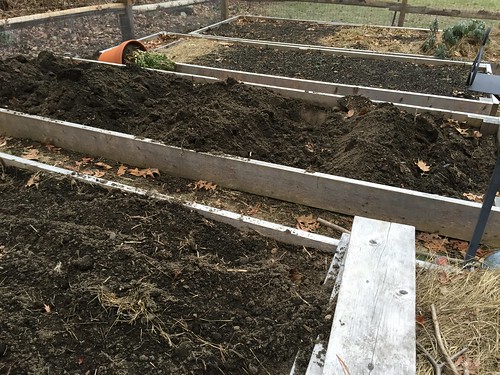
This is a journal of my vegetable gardens. Skippy was my first dog and he thought the garden was his, even though I did all the work. Now Suzie and Charley follow in his footsteps. We're located near Boston (USDA zone 6A). I have a community plot, a backyard vegetable garden, fruit trees, berry bushes, chickens, and bees. I use sustainable organic methods and do my best to grow all of my family's vegetables myself.
peas planted!
▼
Thursday, January 14, 2016
winter tilling
I read at LSUAg that winter tilling can reduce problem insects in the soil. Our soil is about to freeze up, so I turned a few beds that had problems last year. My sweet potatoes were badly damaged by wire worms and other unidentified things. My carrots had root maggots. (Now that I think again, the carrot problem is from flies - not a soil issue. I'll use row cover on them next year.) But the sweet potato bed had soil problems. I won't plant them in that same bed next year. Maybe they can go in the winter tilled carrot bed. I'll do what I can to build up good soil structure this spring. Beneficial nematodes, lots of compost, fish emulsion, biochar, etc.


Hi Kathy - I've never used beneficial nematodes, don't know much about them. Expect that our insect problems will be worse this year because we are having a mild winter.
ReplyDeleteLooks like there are several types of beneficial nematodes. Which do you use? How much do you order for your home garden?
Our ground is way too frozen to do this. I have just started dumping my compost on top of my beds and garden with the plan of rototilling it into the ground in the spring. What are your thoughts on this? I am a notice, trying to learn as much as I can from other gardeners. This spring will be my third garden. My compost this time of the year is a few vegetable peels, but mostly coffee grinds and eggshells.
ReplyDeleteHave a happy day!
Your blogging sister,
Connie :)
I am just planning to experiment for the first time with the nematodes. I've heard they are helpful. I still need to read more about them. Maybe someone can leave me some advise here?
ReplyDeleteConnie,
ReplyDeleteThanks for the note. I love to to talk about compost! It's such a great thing for the garden.
I would advice against dumping your kitchen waste on the beds. First of all, it's kitchen waste you're talking about, not compost. The waste needs to decompose in order to become compost. It will decompose much faster if it's in a bin because it can build up some heat there, the bugs that do the decomposition won't have to crawl all over the place to find the next piece, and the local wild life won't make off with it as easily. Also, you can layer on green material (kitchen scraps, manure) and brown material (dead leaves) more easily, which really helps to make good compost. Another point is that the scraps you mention all decompose at different rates. Egg shells slower than lettuce. So by next spring, you'll have a garden that will still have whole eggshells lying around in it, even though the lettuce will have decomposed.
And finally, (sorry to make this so long - i love to talk about compost), nutrients from compost that is spread on the garden in the fall can be washed away by rain storms before spring. It's contained better against the weather in a bin.
So, maybe you can make a simple bin. I keep meaning to do this for my Mom. So puts her kitchen scraps in a pile near the garden and I know the animals eat half. I like the plain black plastic types. They are inexpensive, simple to assemble and to lift up in the spring. The black color increases heat retention. A cover is good to have and a compost sifter to sift out umcomposted items, like the eggshells. Pieces on un-composted waste in the garden will take nitrogen away from the plants as they decompose, but you can just sift them out and through them back in the compost bin.
Carrots
ReplyDeletePlant near: chives, early potatoes, leeks, lettuce, onions, peas, radishes, rosemary, sage, salsify, wormwood.
Keep away from: strawberries, fennel, cabbage.
Comments: onions, leeks, and wormwood repel carrot flies
I will remember that and put onions and leeks next to my carrots! Thanks. I can alternate rows.
ReplyDeleteMaybe I'll try a row covered with row cover too, just to compare.
Last year I grew them next to celeriac on one side and that they side that got the fly damage. I had cucumbers on the other side.
Thanks for the info about winter tilling. Was a nice day when I read it so went out and turned three beds - then we had 3 snows.
ReplyDeleteHope it cuts down on insect population. Thanks to El Nino,our temps have been too mild to lower their numbers by much.